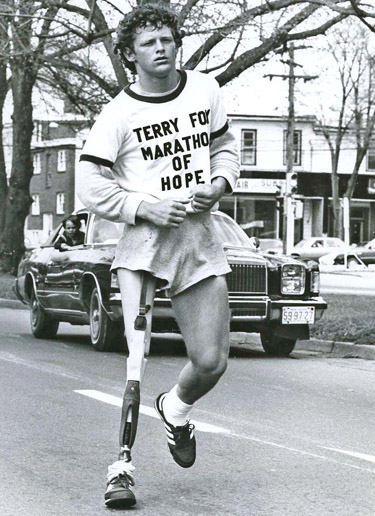Hall of Famer
Terry Fox
Inducted in 1981
Member Details
Career Highlights
Covered 5,342 km in 143 days and raised $23.5 million for cancer research
Lou Marsh Trophy as Canada's Top Athlete of the Year
Named to the Order of Canada
Began "Marathon of Hope" in St. John’s, Newfoundland on April 12,1980

Story
The name Terry Fox has come to symbolize hope, courage, and determination, qualities which were personified in this young marathon runner. After losing a leg to cancer in 1977, Fox ran from Newfoundland to Northern Ontario in order to raise money for cancer research and spread awareness of the disease. His daring crusade touched the hearts of millions of Canadians and his "Marathon of Hope" has since become an annual, worldwide charity event. Even before he embarked on this epic journey, Fox showed unwavering determination to reach his goals in life. As a teenager, he was enamored with basketball and wanted nothing more than to play for his varsity team. Though he was slight in stature and lacked a natural talent for the sport, Fox's tireless perseverance and incontestable confidence earned him a spot on Simon Fraser University's team. It was these qualities that lifted Fox out of a hospital bed and launched him into the realm of a Canadian hero. In 1977, at the age of 18, Fox lost his right leg to bone cancer. While still in recovery, he tried to think of ways to put an end to his suffering and that of the children he met in the cancer clinic. He conceived the idea of a marathon that would span the nation, bring awareness of the disease to every corner of the country, and raise money for cancer research. Fox, himself, would be the sole runner, covering every inch of road from the Atlantic coast to his home in British Columbia, and he would call it the "Marathon of Hope." After months of intensive training, Fox began his journey on April 12th, 1980, in St. John's, Newfoundland. He received little recognition at first. When he initially approached the Canadian Cancer Society with the idea, for instance, it doubted that he could raise his goal of $1 million. But once the marathon was underway, Fox was quick to capture the attention of the nation and donations poured in. He ran, on average, 40km a day, the equivalent of a regular marathon. This was an astounding feat for any athlete, but a sheer miracle for a runner with just one good leg. Fox persevered through pain, fatigue, and harsh weather in pursuit of his goal. He ran for 143 days and covered 5,342km before his odyssey came to an abrupt stop in Thunder Bay, Ontario, on September 2, 1980. Cancer had spread to his lungs, and he was forced to fly back to B.C. for treatment. Despite an iron will and a nagging determination to finish the Marathon of Hope, Fox succumbed to the disease on June 28, 1981, at the age of 22. The young runner had so touched the hearts of Canadians that a national day of mourning was declared on the day of his death. Though he never made it all the way to the Pacific coast, Fox's efforts were not in vain. His marathon raised $23.5 million for cancer research, encouraged hope in those touched by the disease, and inspired awe in everyone who heard the story. Annual marathons in his name are now held across Canada and around the globe, and to date over $650 million has been raised worldwide. Fox received the Lou Marsh Trophy as Canada's top athlete and was named Man of the Year by Canada Press in 1980. He was also named a Companion of the Order of Canada, the nation's top civilian honour.






